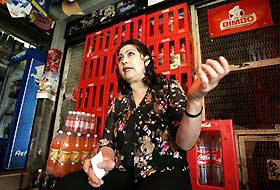 |
 |
 |
 News Around the Republic of Mexico | November 2005 News Around the Republic of Mexico | November 2005  
Mexician Shop Owner Pushed for Big Antitrust Fine against Coca-Cola Bottlers
 Mark Stevenson - Associated Press Mark Stevenson - Associated Press


| | Raquel Chavez, a Mexico City shopkeeper, filed an anti-monopoly complaint that led to a record US$53 million fine against Coca Cola distributors in Mexico. (Photo: AP) |
Mexico City – Mexico has imposed anti-monopoly fines of about $68 million against a Coca-Cola Co. subsidiary and dozens of distributors and bottlers, largely due to a three-year battle waged by one woman who got tired of being told what to sell at her one-room store in an impoverished Mexico City neighborhood.

Raquel Chavez's victory resulted in fines of at least $15 million, according to legal documents provided to The Associated Press by the plaintiffs. That was quickly followed by a $53 million fine in a similar case brought by rival PepsiCo Inc., according to a spokesman for the Federal Competition Commission who was not authorized to give his name, but confirmed both amounts Tuesday.

The amounts are being appealed and by policy will not be publicly announced until the appeals are over.

Coca-Cola Export Corp., the Mexican subsidiary of Coca-Cola Co., based in Atlanta, would only be liable for a small part of any fines that survive the appeal process. Coca-Cola bottlers and distributors would be responsible for the rest, although it wasn't clear exactly how much.

Chavez, 49, expected to lose when a Coke distributor told her to get rid of Big Cola, an upstart brand that arrived in Mexico recently from Peru, or risk having Coke stop selling to her.

"I told them, 'You can't refuse to sell to me. That's unconstitutional'," Chavez told The Associated Press. "I didn't really know if it was unconstitutional, but I said it anyway."

Coca-Cola Co. denied that it has engaged in monopolistic practices.

"As we stated before, we respect the ... decisions," spokesman Charlie Sutlive said. "However, we have used the appeal processes open to us to present arguments that our business practices comply with Mexican competition laws, and to demonstrate that our commercial practices are fair."

Coke, whose share of the Mexican soft drink market hovers around 70 percent, is a must-have item for small stores. Chavez still sells it. But she also resented being told what she could sell.

"You may call the shots everywhere else, but I'm the boss in my store," she told the distributor.

In 2003, her customers began asking for rival "Big Cola," which had begun cutting into Coke's market with lower prices. Coke told her to get rid of the brand, but she refused.

"I am a common citizen who demands her rights, who won't allow herself to be stepped on, that's all," the vigorous, fast-talking Chavez said as she sat on an upturned Coke crate outside her one-story brick shop in the working-class neighborhood.

Chavez took her complaint to the Federal Competition Commission, but after two months of inaction, she blew up at the anti-monopoly agency.

"I told them, 'What are you good for? What purpose do you serve?'" she said. "Are you here to protect Coke, or to defend us?"

They finally accepted her complaint, investigated it, and found evidence of similar incidents – some documented by Big Cola, which later joined the case. Two years later, on July 4, the commission ruled in a closed-door session that 15 Coke bottlers had violated anti-monopoly laws in the case, and fined them about $15 million.

"I was sure we would lose, because in Mexico for so long, people got away with anything," Chavez said.

On Aug. 12, a similar case that had been held up in hearings for years was suddenly resolved – again, with a ruling against 54 Coke distributors who were ordered to pay about $1 million each, the maximum fine allowed.

A copy of one of the rulings obtained by The Associated Press showed that some Coke distributors had threatened to remove company-supplied refrigerators and displays from shops that sold other brands.

The distributors also allegedly shifted competitors' merchandise away from prime locations in some stores, bought it all up and dumped it, or offered Coke merchandise in return for not selling the other brands.

Alfredo Paredes, the communications director for Big Cola's parent company, Ajemex, credits the rulings with "giving us a sense of reassurance ... that these small business owners will no longer be subject to intimidation."

Chavez says "I thought that we would lose this case, and when we did, it was going to be like 'Look, little ant, we crushed you,' because the powerful always win." "Now I feel proud. Maybe now people will start standing up for themselves."

On the Net: www.coca-cola.com | 
 | |
 |



